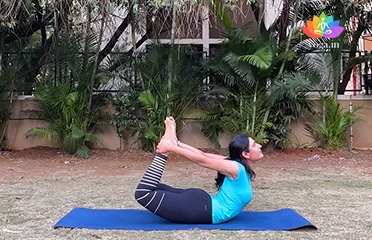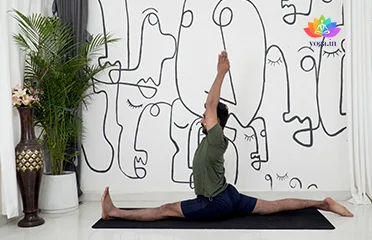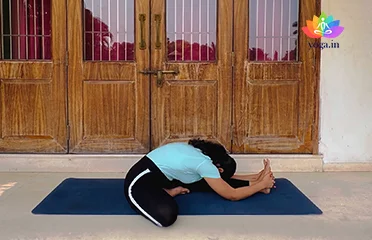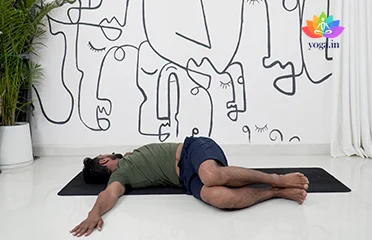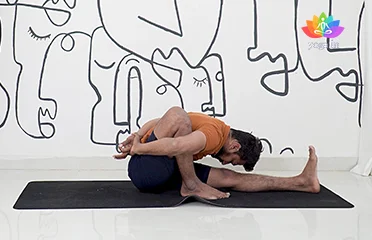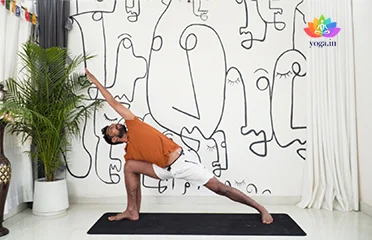Ardha Chandrasana (Half Moon Pose)
अर्धचन्द्रासना / Half Moon Pose
The Sanskrit name is derived from Ardha (अर्ध) meaning half, Chandra [�K]
Bhujangasana (Cobra Pose)
भुजंगासन / Cobra Pose
The Sanskrit name is derived from Bhujanga (भुजंगा) meaning cobra [�K]
Dhanurasana (Bow Pose)
धनुरासन / Bow Pose
The Sanskrit name is derived from Dhanur (धनुर) means bow and Asana [�K]
Hanumanasana (Monkey Pose)
हनुमानासन / Monkey Pose
The Sanskrit name is derived from the Hindu God -Hanuman (हनुमान) [�K]
Hastapadasana (Hand to Foot Pose)
हस्तपदासन / Hand to Foot Pose
The sanskrit name is derived from hasta (हस्त) means hands, pada (पदा) [�K]
Janusirsasana (Head to Knee Pose)
जानुशीर्षासन / Head to Knee Pose
The Sanskrit name is derived from (जानु) Janu means knee, Sirsa (शीर्षा) [�K]
Jathara Parivartanasana (The Abdominal T
ञठर परिवर्तनासन / The Abdominal Twist
The Sanskrit name is derived from Jathara (ञठर) meaning belly or abdomen, [�K]
Marichyasana (Sage Twist Pose)
मरीच्यासन / Sage Twist Pose
The Sanskrit name is derived from Marichya (मरीच्) meaning ray of [�K]
Naukasana (Boat Pose)
नौकासन / Boat Pose
The Sanskrit name is derived from Nava ( नाव) meaning boat and asana (आसन) [�K]
Parsvakonasana (Extended Lateral Angle P
पार्श्वकोनासन / Extended Lateral Angle Pose
The Sanskrit name is derived from Parsva (पार्श्व) meaning side, [�K]
- 1
- 2
- 3
Finding Relief – Yoga for Acidity
How Yoga Can Help Cure Acidity
Many of us experience that uncomfortable burning sensation in the chest – acidity, also known as acid reflux or heartburn. It’s caused by stomach acid flowing back up into the esophagus, leading to irritation and discomfort.
While dietary changes and medication can be helpful, yoga can also play a supporting role in managing acidity. Here’s how:
Understanding Acidity:
Acidity occurs when the lower esophageal sphincter (LES), a muscular valve at the bottom of the esophagus, weakens or relaxes inappropriately. This allows stomach acid to rise back up, causing that burning feeling.
Key Factors Contributing to Acidity:
- Diet: Spicy, fatty, acidic, and processed foods can trigger heartburn.
- Lifestyle: Smoking, alcohol consumption, and excess caffeine intake can weaken the lower esophageal sphincter (LES), the muscular valve that prevents acid reflux.
- Overeating: Stretching your stomach with large meals can put pressure on the LES, leading to backflow.
- Certain medications: Medications like aspirin, ibuprofen, and some antidepressants can relax the LES.
- Hiatal hernia: This condition occurs when part of your stomach pushes through the diaphragm and into your chest, weakening the LES.
- Pregnancy: Hormonal changes and a growing uterus can put pressure on the stomach, contributing to acidity.
Symptoms of Acidity:
- Burning sensation in the chest (heartburn)
- Sour taste in the mouth
- Difficulty swallowing
- Chest pain
- Dry cough
- Regurgitation of food or sour liquid
Treatment of Acidity through Yoga and Pranayama:
Yoga and Pranayama can offer a holistic approach to managing acidity by:
- Strengthening the digestive system: Certain yoga poses can stimulate digestion and improve gut motility.
- Reducing stress: Stress can exacerbate acidity symptoms. Yoga and Pranayama promote relaxation and stress management.
- Improving overall health and well-being: A healthy lifestyle, including regular yoga practice, can contribute to managing digestive issues like acidity.
Diet for Acidity:
- Focus on whole, unprocessed foods: Fruits, vegetables, whole grains, and lean protein.
- Limit spicy, fatty, and acidic foods.
- Eat smaller, more frequent meals.
- Drink plenty of water.
- Avoid late-night meals.
Caution for Acidity:
- Consult a doctor before starting any new exercise program, especially if you have pre-existing medical conditions.
- Listen to your body and avoid any poses that cause discomfort.
- Modify poses as needed to suit your ability level.
Contraindications:
- Pregnant women should avoid certain poses that put pressure on the abdomen.
- People with hiatal hernia or severe GERD may need to modify or avoid some poses.
- Always consult your doctor before practicing yoga if you have any concerns.




